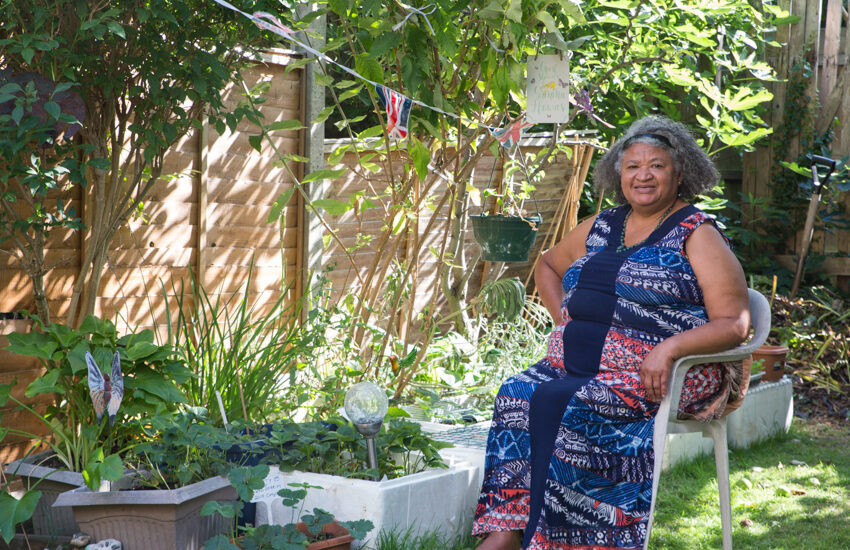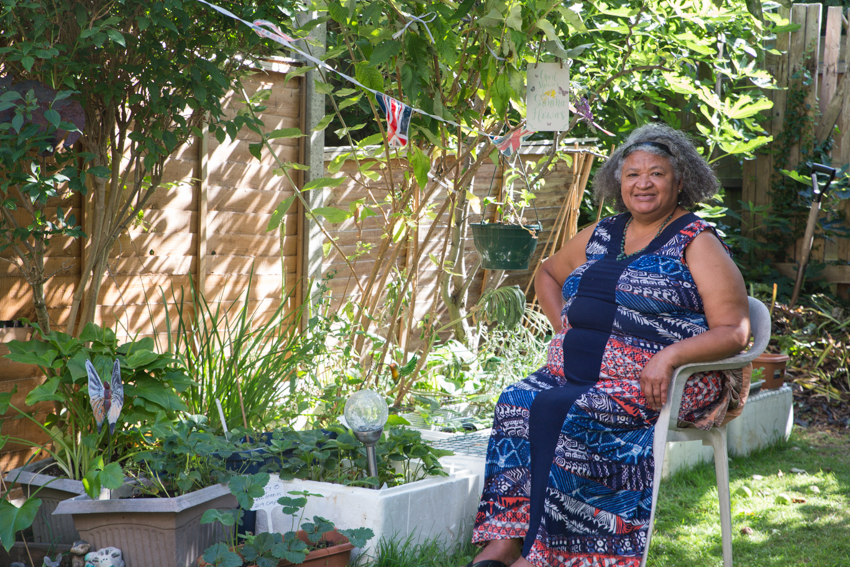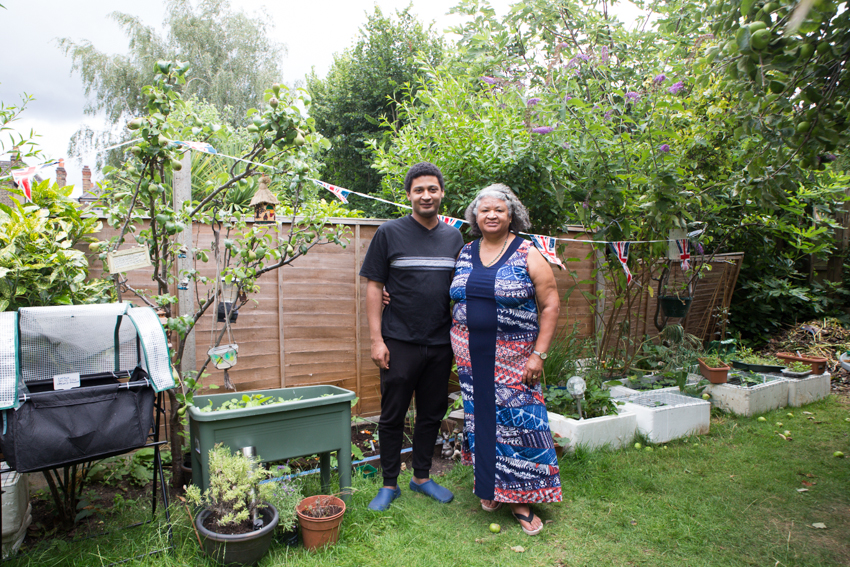Earline Hilda Castillo Binger: Caring for plants is a way to care for people too
STORIES

The Museum has received funding from the National Lottery Heritage Fund for a project to record and celebrate the gardens made in south London by members of the Windrush generation. Janine Nelson, our Head of Learning, visits Earline Hilda Castillo Binger at her garden in Herne Hill. It is Hilda’s 70th birthday this week, 18th November. She was planning a birthday celebration with her gardening group which due to lockdown may not now happen. I cycled over to say hello to her and drop of a gift. It’s was my 3rd visit to her house in Herne Hill this year. 

 I cycled over on 4th July and met the project photographer, Ingrid Guyon, at Hilda’s home in Herne Hill, which is just down the road from Brockwell Park. The weather was showery and not particularly warm. Walking through the alley to reach Hilda’s side gate to the back garden, what struck me immediately was how alive the garden was, bursting with plants in every corner, on every window sill, in various stages of cultivation, with labels (often humorous), bunting and quirky decorations. Many of the plants seemed to be edible. I sat at a garden table to chat whilst Ingrid unpacked her camera.
I cycled over on 4th July and met the project photographer, Ingrid Guyon, at Hilda’s home in Herne Hill, which is just down the road from Brockwell Park. The weather was showery and not particularly warm. Walking through the alley to reach Hilda’s side gate to the back garden, what struck me immediately was how alive the garden was, bursting with plants in every corner, on every window sill, in various stages of cultivation, with labels (often humorous), bunting and quirky decorations. Many of the plants seemed to be edible. I sat at a garden table to chat whilst Ingrid unpacked her camera. 
 Hilda’s garden has changed over the 40 years that she has lived there. Her husband, Earl, used to be in charge of certain of the tasks in the garden. Sadly, he died two years ago in February 2018. When he was ill, he would ask Peter to cut the grass for his mum and look after the grapevine and the roses. But Hilda already knew by then, the pattern of seasonal tasks that the garden required. She, and now Peter, have taken over much of the garden for food growing. During the first lockdown, Peter was gardening three or four hours a day.
Hilda’s garden has changed over the 40 years that she has lived there. Her husband, Earl, used to be in charge of certain of the tasks in the garden. Sadly, he died two years ago in February 2018. When he was ill, he would ask Peter to cut the grass for his mum and look after the grapevine and the roses. But Hilda already knew by then, the pattern of seasonal tasks that the garden required. She, and now Peter, have taken over much of the garden for food growing. During the first lockdown, Peter was gardening three or four hours a day. 


 At the beginning, when she first moved in to Herne Hill, she wanted to plant fruit trees, ‘at that time it was very much about putting down some roots of things that you can eat.. because these fruit trees, have matured now and I’m giving the apples away’. The grapevine in her garden is much loved by both Peter and Hilda. It reminds them both of Earl. And Hilda loves to make wine with the grapes, using the wine making kit she bought. As a child she was ‘daddy’s girl’ and helped him with outdoor tasks despite the fact that girls usually helped indoors and boys outdoors at that time. Even after she’d moved to Britain, she would go back to Trinidad on holiday at specific times of year so that she could help him harvest coffee and cocoa. She remembers as a child, her and her siblings taking a little bit of their grandmother’s coffee, children weren’t allowed to drink coffee instead they could drink chocolate. They learnt how to make chocolate by parching the dried beans over a fire. The beans were then beaten into a powder with a mortar and pestle which was then rolled up to form chocolate balls. The balls could then be grated and used with milk and spices to make a hot chocolate drink. Children were also encouraged to drink bush, similar to herbal tea. This was tea made with leaves of different plants, including lime bud ‘which was good for weaning babies’, soursop and Caraili, which is ‘good for diabetes you know’. Hilda hasn’t been slowing down this year as she approaches her 70th birthday. She took on leading an additional gardening project at Grantham GP practice in Stockwell this summer, wrote a newsletter for the Lambeth GP Food Co-op website and delivered a talk on zoom for the ‘South London Botanical Institute in October. Happy 70th Birthday Hilda!
At the beginning, when she first moved in to Herne Hill, she wanted to plant fruit trees, ‘at that time it was very much about putting down some roots of things that you can eat.. because these fruit trees, have matured now and I’m giving the apples away’. The grapevine in her garden is much loved by both Peter and Hilda. It reminds them both of Earl. And Hilda loves to make wine with the grapes, using the wine making kit she bought. As a child she was ‘daddy’s girl’ and helped him with outdoor tasks despite the fact that girls usually helped indoors and boys outdoors at that time. Even after she’d moved to Britain, she would go back to Trinidad on holiday at specific times of year so that she could help him harvest coffee and cocoa. She remembers as a child, her and her siblings taking a little bit of their grandmother’s coffee, children weren’t allowed to drink coffee instead they could drink chocolate. They learnt how to make chocolate by parching the dried beans over a fire. The beans were then beaten into a powder with a mortar and pestle which was then rolled up to form chocolate balls. The balls could then be grated and used with milk and spices to make a hot chocolate drink. Children were also encouraged to drink bush, similar to herbal tea. This was tea made with leaves of different plants, including lime bud ‘which was good for weaning babies’, soursop and Caraili, which is ‘good for diabetes you know’. Hilda hasn’t been slowing down this year as she approaches her 70th birthday. She took on leading an additional gardening project at Grantham GP practice in Stockwell this summer, wrote a newsletter for the Lambeth GP Food Co-op website and delivered a talk on zoom for the ‘South London Botanical Institute in October. Happy 70th Birthday Hilda!
—
Hilda was interviewed by Janine Nelson, Head of Learning at the Garden Museum. Janine worked alongside Hilda at Lambeth GP Surgery in 2013 to jointly run gardening sessions there, having set up an outreach gardening project there in 2011.
Extracts from an interview recorded with Earline Hilda Castillo Binger on 4th July 2020. This is the first of 10 portraits of gardeners based in south London with roots in the Caribbean.
Lambeth GP Food Co-op has published cook books with recipes contributed to by members of Lambeth’s diverse communities. Proceeds help build more gardens for patients in hospitals and Lambeth GP clinics. Members of the Garden Museum learning team have contributed recipes including Ceri Jones, our Food Learning Officer as have Hilda and patient gardeners from Lambeth Walk GP surgery, to the second of their cook books. It is available directly from Lambeth GP Food Co-op for £8 (including postage and packing) and can be ordered by emailing gpfoodcoop@gmail.com or phoning 07908 834203. Recently Lambeth GP Food Co-op has created a Gardening Buddy Scheme. The scheme aims to support patients, some of whom have little or no gardening experience to grow food at home with the aims:
- To support, help and encourage people to garden successfully at home.
- To offer skilled telephone support to patients self-isolating or being shielded at home.
- To encourage, motivate and support patients’ part in the project to grow vegetables and to feel less isolated.
If you are interested in getting involved then you can contact Lambeth GP Food Co-op for an application form. Photography by Ingrid Guyon.